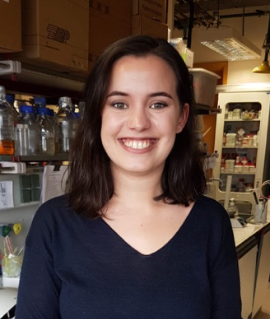Title : Mechanism of Action of Clotrimazole-Linked CO-Releasing Molecules
Abstract:
Antibiotic resistance is one of the major causes of death worldwide increasing the demand for novel type of antibiotics. In the last years, the class of metal-based carbon monoxide releasing molecules (CORMs), that are active CO donors, have been described as bactericidal compounds. More recently, CORM conjugated with azoles were found to be effective antimicrobials against several microbes. To study the parameters that modulate its antimicrobial action, CORM-clotrimazole conjugates we produced several with various metals and ligands and tested their effect on Gram-positive and Gram-negative bacteria. Data showed that the bactericidal activity of the CORM-clotrimazole conjugates depend on the ligand but not on the metal. Of relevance, these conjugates were found to be more than the sum of its parts: while the CORM scaffold has no antibacterial activity and clotrimazole shows only moderate minimal inhibitory concentrations, the potency of the conjugates is one order of magnitude higher than that of clotrimazole. Treatment of Staphylococcus aureus with the most powerful compound of the studied series, namely ReBpyCtz, affects cellular energy functions, interferes with the membrane topology, and inhibits peptidoglycan biosynthesis. Exposure of S. aureus to ReBpyCtz, triggers a sequence of events that is initiated by membrane insertion, followed by membrane disorganization, inhibition of peptidoglycan synthesis, release of CO, and breaking down of the membrane potential.
Therefore, the conjugation of CORMs with known antimicrobial drugs has the potential to generate compounds that due to synergistic effects are more potent than the drug alone.
What will audience learn from your presentation?
- Carbon monoxide-releasing molecules (CORMs) conjugated with antibiotics can have an increased antimicrobial activity.
- The ligands of the CORMs modulate the antimicrobial activity.
- CORM conjugates are internalized and perturb the membranes of Gram-positive bacteria.


